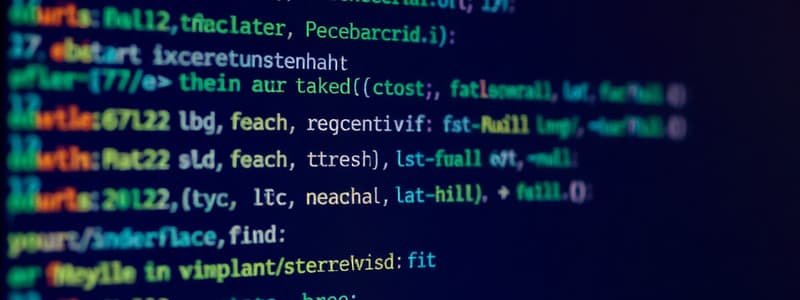Podcast
Questions and Answers
What is the return value of strcmp() when two strings are identical?
What is the return value of strcmp() when two strings are identical?
- -1
- 0 (correct)
- 2
- 1
Which header file is required to use the strcat() function?
Which header file is required to use the strcat() function?
- <stdlib.h>
- <stdio.h>
- <ctype.h>
- <string.h> (correct)
What does the strcat() function do in C programming?
What does the strcat() function do in C programming?
- Finds the length of a string
- Compares two strings
- Concatenates two strings (correct)
- Copies one string to another
What is the correct way to declare a string in C?
What is the correct way to declare a string in C?
What happens if the destination array in strcat() is not large enough?
What happens if the destination array in strcat() is not large enough?
How can you manually copy a string without using strcpy()?
How can you manually copy a string without using strcpy()?
What will the output of strcmp(str1, str2) be if str1 = "abcd" and str2 = "abCd"?
What will the output of strcmp(str1, str2) be if str1 = "abcd" and str2 = "abCd"?
What data type is returned by the strcat() function?
What data type is returned by the strcat() function?
What happens when the input contains a space in the scanf() function?
What happens when the input contains a space in the scanf() function?
Why don't we use '&' with the char array in scanf()?
Why don't we use '&' with the char array in scanf()?
What is the return type of the strlen() function?
What is the return type of the strlen() function?
What is the purpose of the strcpy() function?
What is the purpose of the strcpy() function?
What will be the output of strlen() for the string 'Hello'?
What will be the output of strlen() for the string 'Hello'?
Which header file is required for using standard string functions like strcpy() and strlen()?
Which header file is required for using standard string functions like strcpy() and strlen()?
What does the strcat() function do?
What does the strcat() function do?
What is the correct syntax for the strcpy() function?
What is the correct syntax for the strcpy() function?
What is the correct way to declare a string in C programming?
What is the correct way to declare a string in C programming?
Which statement is true about string initialization in C?
Which statement is true about string initialization in C?
What will happen if you try to assign a string to a declared char variable in C?
What will happen if you try to assign a string to a declared char variable in C?
What function can be used to read a string input from the user?
What function can be used to read a string input from the user?
Which of the following string initializations is incorrect?
Which of the following string initializations is incorrect?
How does the compiler treat a string enclosed in double quotation marks?
How does the compiler treat a string enclosed in double quotation marks?
In which scenario will you likely encounter an error regarding string declaration?
In which scenario will you likely encounter an error regarding string declaration?
Which of the following operations is NOT valid for strings in C?
Which of the following operations is NOT valid for strings in C?
Flashcards
strcpy()
strcpy()
Copies a string from one variable to another.
strcmp()
strcmp()
Compares two strings character by character.
strcmp() return value
strcmp() return value
Returns 0 if strings are equal, non-zero otherwise.
strcat()
strcat()
Signup and view all the flashcards
String Copy (without strcpy())
String Copy (without strcpy())
Signup and view all the flashcards
Character-by-character Comparison
Character-by-character Comparison
Signup and view all the flashcards
String Concatenation
String Concatenation
Signup and view all the flashcards
String
String
Signup and view all the flashcards
Why was only "Dennis" stored?
Why was only "Dennis" stored?
Signup and view all the flashcards
Why is '&' not used with 'name' in scanf?
Why is '&' not used with 'name' in scanf?
Signup and view all the flashcards
What does strlen() do?
What does strlen() do?
Signup and view all the flashcards
What is the return type of strlen()?
What is the return type of strlen()?
Signup and view all the flashcards
What is the purpose of strcpy()?
What is the purpose of strcpy()?
Signup and view all the flashcards
What does strcpy() return?
What does strcpy() return?
Signup and view all the flashcards
What does strcmp() do?
What does strcmp() do?
Signup and view all the flashcards
What does strcat() do?
What does strcat() do?
Signup and view all the flashcards
String in C
String in C
Signup and view all the flashcards
Declaring a String
Declaring a String
Signup and view all the flashcards
Initializing a String
Initializing a String
Signup and view all the flashcards
Why is initializing with {} important?
Why is initializing with {} important?
Signup and view all the flashcards
Why can't you assign strings directly?
Why can't you assign strings directly?
Signup and view all the flashcards
Reading a string from the user
Reading a string from the user
Signup and view all the flashcards
What is the null character important for?
What is the null character important for?
Signup and view all the flashcards
How should you read a string from the user?
How should you read a string from the user?
Signup and view all the flashcards
Study Notes
Strings
- Strings in C are sequences of characters terminated by a null character (\0).
- When enclosed in double quotes, the compiler automatically adds the null character.
- Example:
char c[] = "cstring"; - Declaring a string of 5 characters:
char s[5]; - Initializing strings: Various methods exist.
char c[] = "abcd";char c[50] = "abcd";char c[] = {'a', 'b', 'c', 'd', '\0'};char c[5] = {'a', 'b', 'c', 'd', '\0'};
- Important: Avoid assigning strings longer than the declared array size (e.g.,
char c[5] = "abcde";). This is incorrect and will lead to issues. - Arrays and strings are not assignable in C after declaration (e.g.,
char c[100]; c = "C programming";is incorrect). - Reading strings: Use
scanf("%s", name);to read a string from the user, but this stops at whitespace.
Standard Library String Functions
-
strlen(): Calculates the length of a given string.- Returns a
size_tvalue (an unsigned integer). - Defined in
<string.h>.
- Returns a
-
strcpy(): Copies a string to another.- Takes two arguments: destination string, source string, both of type
char. - Copies the source until the null terminator.
- Returns the copied string (destination string).
- Defined in
<string.h>
- Takes two arguments: destination string, source string, both of type
-
strcmp(): Compares two strings character by character.- Returns 0 if they are equal.
- Returns a non-zero value if they're not equal. Positive if the first string is lexicographically larger.
- Defined in
<string.h>.
-
strcat(): Concatenates (joins) two strings.- Takes the destination and the source strings as arguments (destination needs space for the combined string).
- Adds the source string to the end of the destination string.
- Returns a pointer to the destination string (which is now modified).
- Defined in
<string.h>.
String Operations without Library Functions
- Copying a string: Use loops to copy characters one by one, ensuring the destination string has enough space. Handles truncation if the destination is shorter.
- Finding string length: Use a loop to count characters until the null terminator is found.
Structures
-
Structures are used to group variables of different data types together.
-
Example:
struct employee {int id; char name[100]; float salary;}; -
Declaring a structure variable:
struct employee emp1; -
Accessing structure members: Use the dot operator:
emp1.id = 101; strcpy(emp1.name,"John Doe"); -
Declaring a structure with variables:
struct employee emp1, emp2; -
Data types used:
-
int,char,float,double, etc. -
Array of Structures:
- Stores multiple structures.
- Used to store data about collections of different entities.
- Example:
struct student st[5];for storing information about 5 students.
Studying That Suits You
Use AI to generate personalized quizzes and flashcards to suit your learning preferences.




